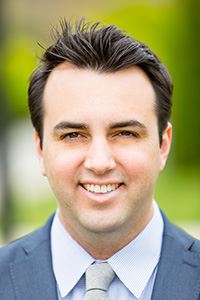3L Marc Rodriguez is, in many ways, a non-traditional law student. In addition to beginning law school after a prior career, Marc undertook a successful campaign for Annapolis City Council during his first year at Maryland Carey Law. But it was precisely Marc’s rich array of personal and professional experiences that positioned him for making a tremendous impact both for his constituents and for his clinic clients.
Following a childhood spent splitting time between Mexico City and Annapolis, Maryland, Marc worked for seven years in business and finance in Hong Kong before returning to the States to attend law school. Marc wanted to connect with the community and became a volunteer with then-Annapolis City Councilman Jared Littman '97. When Littman decided not to run for another term, he recruited Marc to run for the open seat—during the same semester that he was starting at Maryland Carey Law. Marc was apprehensive, but Littman knew that Marc could be a culturally competent voice for all Annapolis residents, including the 20 percent who are Hispanic or Latino. With Marc’s victory, he became the first Hispanic/Latino elected official in the history of the Annapolis City Council.
Meanwhile, Marc was getting ready to embark on what he describes as “the most transformative experience in his law school career,” as a student-attorney in the Immigration Clinic under the guidance of Prof. Maureen Sweeney and Staff Attorney Gabriela Kahrl. In addition to representing multiple family members in their asylum claims, he successfully argued for the release of a father whom had already been denied bond twice. This rare victory on a third bond attempt came as the client’s children were suffering major mental health crises as a result of his detention. Under Kahrl’s leadership, Marc collaborated with CAIR Coalition, WISE Women and the Annapolis Immigration Justice Network to help convince Anne Arundel County Executive Steuart Pittman to use county revenue derived from leasing county jail space to ICE to fund much-needed immigrant pro bono legal services. Marc credits the instruction, guidance and ongoing mentorship he received from Sweeney and Kahrl as “truly life-altering.”
One of Marc’s other clients was an Annapolis resident and, later, his constituent. After his clinic representation had ended, Marc worked alongside this client to resolve her housing issues and help her obtain affordable health care. His experiences working with this client and other like her made him passionate about remedying obstacles to housing that so many immigrants face beyond the obstacle of not being able to reside in this country. He had visited constituents who had nine families living in a basement, all sharing one bathroom, because they couldn’t access safe, affordable housing. He understood that “if you aren’t living in a safe and private space, so many other things in your world are falling apart.”
Marc enrolled in Contemporary Issues in American Housing with (now retired) clinic professor Barbara Bezdek, and began exploring creative ways to help his constituents dealing with housing issues. Prof. Bezdek directed Marc to scholarly papers advocating for federal housing protections based on an applicant’s immigration status, and an idea formulated in his mind: Why not introduce similar legislation on a local level? He expanded on this idea in his final paper for the course in later 2018, and by spring 2019 had introduced legislation in the Annapolis City Council.
Marc’s bill made immigration status a protected category under Annapolis fair housing law, and required landlords to seek less discriminatory ways of conducting applicants’ background checks so that residents without a social security number wouldn’t be denied a rental. He worked closely with both Profs. Bezdek and Sweeney to refine the bill to address the concerns of stakeholders, and the bill eventually passed unanimously. With its passage, Annapolis became the third jurisdiction after California and New York City to affirmatively protect residents’ housing rights based on immigration status.
For as much as Marc credits Prof. Sweeney as an inspiration, she has been equally inspired by the impact Marc has had on the Annapolis community. As Prof. Sweeney reflects, “Marc has a gift for applying his legal skills to real life situations and working toward creative solutions, and his broad understanding of how to engage in problem solving for communities and community members is truly unique.”
Marc is expected to graduate with his juris doctor in December 2019, and his professors are excited at what more he can accomplish.

